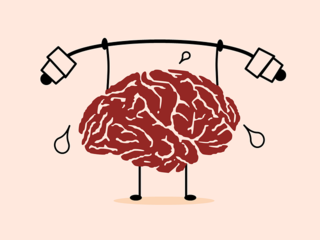How Your Mental Health Reaps the Benefits of Exercise
New research shows why physical exercise is essential to mental health.
Posted Mar 22, 2018 from www.psychologytoday.com

You almost certainly already know that an inactive lifestyle contributes to chronic miseries such as obesity, diabetes, heart disease, cancer, osteoporosis, and an earlier death. You may also be one of the third of us who’ve recently resolved to exercise more.
But how often do you consider the contribution of physical exercise to your mental health?
Rates of depression and anxiety are at their highest recorded levels in countries as diverse as India, China, the U.S., and the UK. Undoubtedly, many aspects of “modern life” — increasing social isolation, poor diets, a focus on money and image — contribute to this state. However, inactivity is another key factor.
Most of us find that a sunny walk or trip to the gym improves our mood in the short term. Exercise is well known to stimulate the body to produce endorphins and enkephalins, the body’s natural feel-good hormones which can make problems seem more manageable. The simple act of focusing on exercise can give us a break from current concerns and damaging self-talk. Further, depending on the activity, people may benefit from calming exercises, be energized, and get outside or interact with others, all of which are known to improve mood and general health.
However, the idea that physical exercise might do something really fundamental for mental health is less immediately obvious — especially given the Western distinction between “mind” and “body” that implies mental and physical health can be separated.

In fact, increasingly robust evidence suggests that exercise is not only necessary for the maintenance of good mental health, but it can be used to treat even chronic mental illness. For example, it is now clear that exercise reduces the likelihood of depression and also maintains mental health as we age. On the treatment side, exercise appears to be as good as existing pharmacological interventions across a range of conditions, such as mild to moderate depression, dementia, and anxiety, and even reduces cognitive issues in schizophrenia.
But how?
Put simply: Exercise directly affects the brain. Regular exercise increases the volume of certain brain regions — in part through better blood supply that improves neuronal health by improving the delivery of oxygen and nutrients; and through an increase in neurotrophic factors and neurohormones that support neuron signaling, growth, and connections.
Of critical importance for mental health is the hippocampus — an area of the brain involved in memory, emotion regulation, and learning. Studies in other animals show convincingly that exercise leads to the creation of new hippocampal neurons (neurogenesis), with preliminary evidence suggesting this is also true in humans.
What does this all mean? Theories suggest that newborn hippocampal neurons are likely to be particularly important for storing new memories and keeping old and new memories separate and distinct. Thus, neurogenesis allows a healthy level of flexibility in the use of existing memories, and in the flexible processing of new information.
Much mental ill health is characterized by a cognitive inflexibility that keeps us repeating unhelpful behaviors, restricts our ability to process or even acknowledge new information, and reduces our ability to use what we already know to see new solutions or to change. It is therefore plausible that exercise leads to better mental health in general, through its effects on systems that increase the capacity for mental flexibility.
“OK, I’m in. But how much exercise?”
Psychiatrist Madhukar Trivedi, has shown that three or more sessions per week of aerobic exercise or resistance training, for 45 to 60 minutes per session, can help treat even chronic depression. Effects tend to be noticed after about four weeks (which incidentally is how long neurogenesis takes), and training should be continued for 10-12 weeks for the greatest anti-depressant effect.
The brain actually has a neat trick to get us back on track too. As outlined by Psychology Today blogger Christopher Bergland, even small improvements in exercise levels or diet create a positive upward spiral that increases the sensitivity of the dopamine receptors that signal reward, so that exercise will eventually become rewarding, even if that seems unimaginable at the outset.

